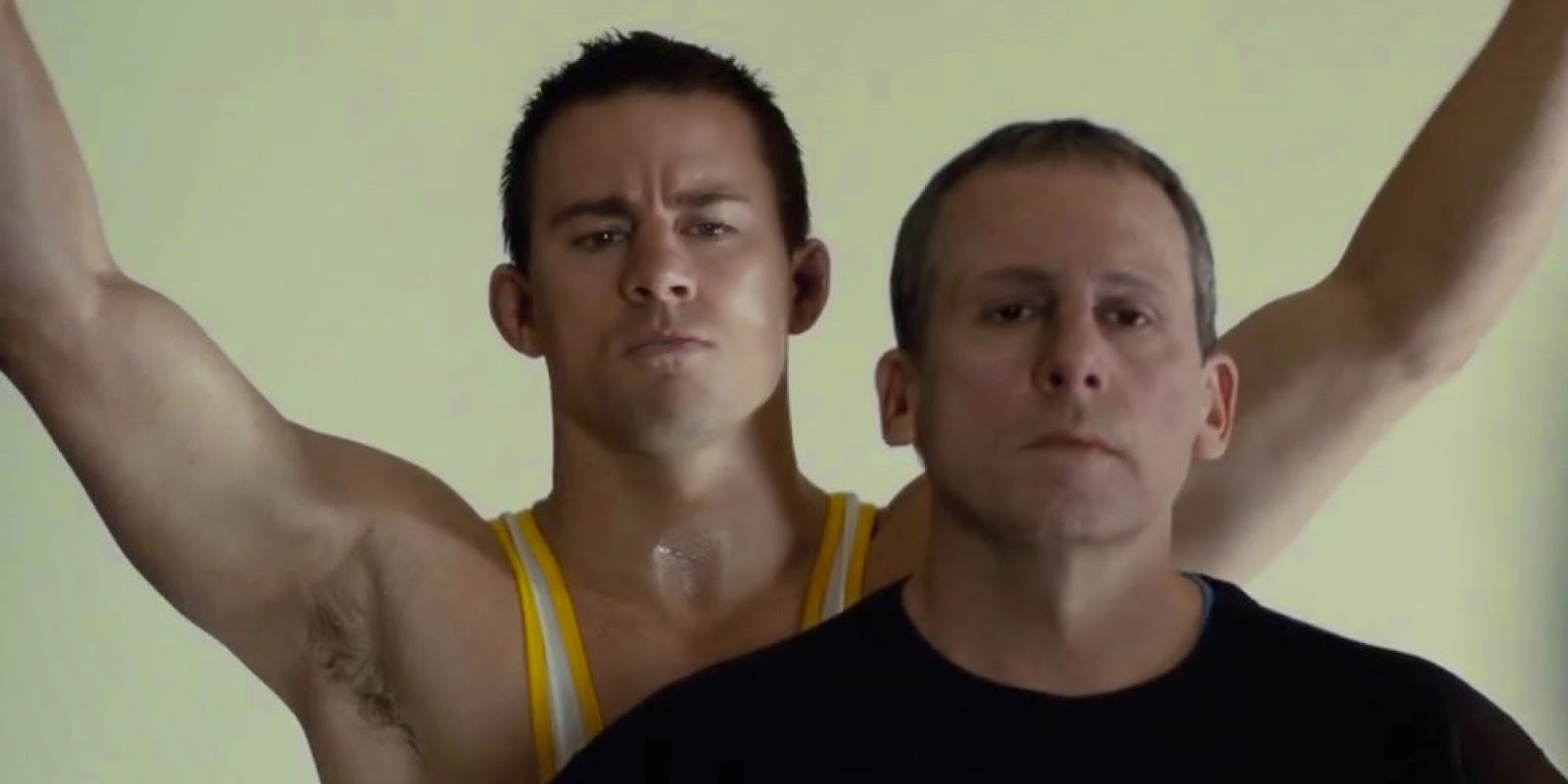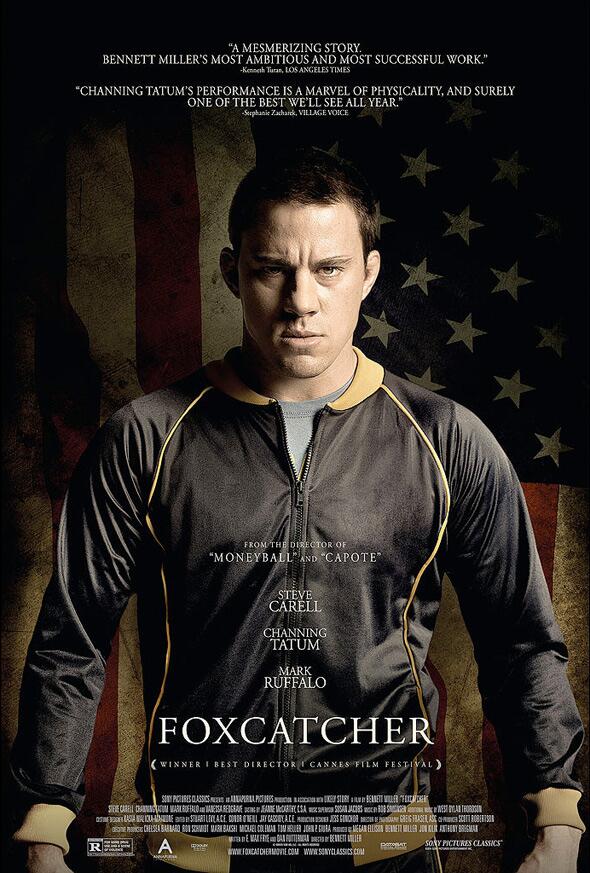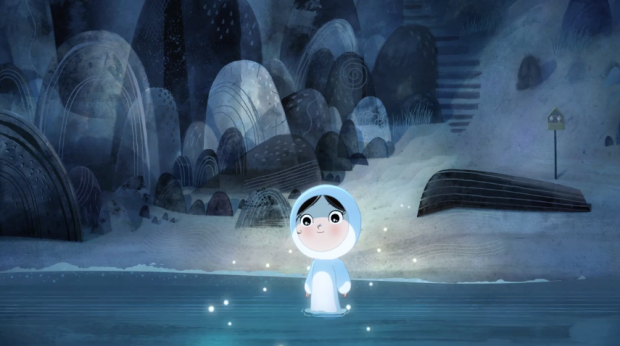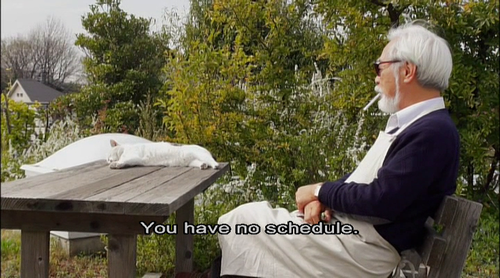TIFF: Two to see again in "Foxcatcher" & "Song of the Sea"
 Tuesday, September 9, 2014 at 11:07PM
Tuesday, September 9, 2014 at 11:07PM Nathaniel's adventures at TIFF. Days Whichever.
Here are a two films that I feel I should see again, primarily because they're ambitious works and I wonder if my response would change if I had more familiarity with their visual language. You know how that goes with more complicated art.
FOXCATCHER

Bennett Miller, a remarkably consistent auteurial voice, once again demonstrates great aptitute at exploring masculine intimate true stories and mining them for larger weighty themes, without any of the glazy sentiment that tends to be slathered onto both sports movies and biopics. His best move here is to study the alien body language of wrestlers, like it's a foreign tongue for which close visual track is your only form of subtitles. Channing Tatum and Mark Ruffalo speak this foreign tongue fluently. They play Mark and Dave Schultz, Olympic Gold Medalists in wrestling, "a low sport" (that's Mother DuPont's words as perfectly uttered by Vanessa Redgrave). Into their lives comes a would be patron and "coach" John DuPont, a filthy rich patriotic nutjob who completely takes over and irrevocably and tragically alters their fate.
I was interested the whole time, but unfortunately it never fully engrosses, and moves as if mired in grandiloquent molasses. The line deliveries follow suit with simple sentences feeling as long as paragraphs. The movie improves as it goes, though, ending with a gut punch. I'm not sure why I found it offputting, exactly, despite easily identifiable strengths, but I'm going to chalk it up to its over confidence in its own greatness and the conception and execution of the catalystic figure Steve Carell's John DuPont. It's a very prosthetics and mimicry-based performance of a very difficult role -- to say these words and bring nuance rather than "i'm a dangerous pathetic nutjob!" I can't imagine -- and it's hard to feel the inexorable gravitational pull of any of the great tragedies (which I think this wants to be) when everything is so telegraphed as to its danger and when that gravitational pull towards tragedy is so slow, that any able bodied athlete out to be able to outrun it.
 Best in Show: Easily Channing Tatum, who holds his jaw and body so distinctively that you feel, at all times, the monotonous life of this character: the training, the muscle soreness, the lack of any stimulation outside of the physical. He's heartbreatking, really, unable to articulate what meager thoughts are in his easily manipulated mind and body. His body is thick but his skin is thin with easily bruised feelings. Tatum totally understands the character, a manchild who just can't wrestle himself out from under any father figure's shadow.
Best in Show: Easily Channing Tatum, who holds his jaw and body so distinctively that you feel, at all times, the monotonous life of this character: the training, the muscle soreness, the lack of any stimulation outside of the physical. He's heartbreatking, really, unable to articulate what meager thoughts are in his easily manipulated mind and body. His body is thick but his skin is thin with easily bruised feelings. Tatum totally understands the character, a manchild who just can't wrestle himself out from under any father figure's shadow.
Honorable Mention: Mark Ruffalo, also excellent throughout, is particularly sensational in one of the movies rare scenes that plays as much for uncomfortable comedy as it does for dramatic arc. He's asked to be a talking head on a documentary and finds his lines thoroughly distasteful. B (but Channing & Mark are total "A"s)
Oscar chances: A threat in all categories but particularly Supporting Actor and maybe Director
SONG OF THE SEA

This Irish animated film, from the team that brought you The Secret of Kells, is so visually impressive that my eyes were twice their normal size trying to take it all in. I'd need a second pass to focus on the story which might be presented a touch too juvenile, like it's an animated film for very young children when its beauty and imagination are such that it really should be thinking bigger and aim for all ages. It's the tale of a little boy who loses his mother in the birth of his sister, who he then blames for everything for years. Some time later he discovers she's a magical being which means the fairy tales his mother told him in the film's prologue were true. In this world which is our world but filtered through animation that sees everything in glorious watercolor style backdrops, two dimensional lines, bright circles, and dazzling color patterns (my god its beautiful), all the magical beings are slowly being turned to stone. But why and how can he save his sister from the same fate?
Other than the fairies, who I didn't really enjoy, the character designs are compelling, especially for the central family and any animals in the film. The two best characters are the family's giant sheepdog, all bangs and tongue and loyalty and a memorable villain in "The Owl Witch" whose motives and arc are unusually strong and fascinating for this sort of movie. B+
Oscar Chances: it's so unlike any American CG animated film that it will really stand out in the crowd. I'd call it a certain contender for the Best Animated Feature Oscar - GKids will qualify it this year - but the category sure is getting competitive so who knows.
Also at TIFF: A Little Chaos, Wild, The Gate, Cub, The Farewell Party, Behavior, The Theory of Everything, Imitation Game, 1001 Grams, Labyrinth of Lies, Sand Dollars, The Last Five Years, Wild Tales, A Pigeon Sat on a Branch Reflecting on Existence, Force Majeure, Life in a Fishbowl, Out of Nature, The Kingdom of Dreams and Madness, Charlie's Country, and Mommy












